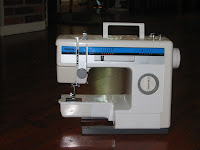
Dan and I planned a second trip with my mother about a month after Cooperstown. We had the bullet points neatly lined up; no overnights, someplace familiar, and nothing far away so a long drive wouldn’t exhausted her. We settled on Newport, Rhode Island. She had been there before and loved it. The shops are plentiful and quaint, the mansions are spectacular, and the ocean meets the shore in gorgeous white sprays. We figured we’d tour one mansion, eat, and then browse a few shops if she was up to it.
We purchased tickets to Astor’s Beechwood Estate. It stood stout and grand amidst the emerald lawn, the ocean glowing at its back. I got out of the car and took a deep, refreshing breath.
“What is this place?” my mother said suspiciously.
“This was the vacation home of the Astor’s, Ma, do you believe it?” I said. “They only lived here about 8 weeks out of the year.”
“What? Who are the Astor’s? Do I know them?” Her gaze swept the breadth of the house. “I don’t like it here.”
A tickle of apprehension sprouted at the back of my belly, but I mowed it down. I wanted her so much to enjoy this.
“No no, Ma. You’ll love it! Wait til you see the inside.” I said enthusiastically. “Let’s hurry, the tour is starting soon.”
The tour began shortly after our arrival - A day in the life of Mrs. Astor circa 1891. We would be taken around by her “daughter,” in complete period dress, with maids scurrying about, cooks asking questions, everyone speaking in haughty English.
“Why are they talking like that? I don’t understand what they are saying.”
I glanced at my mother. We had only been touring for five minutes and her skin at the rim of her wig was drenched in sweat.
“I don’t know where I am,” she said. “I feel sick and dizzy.”
The panic came quickly for me. “Dan, I have to get her out of here.” I said, holding my mother firmly under the arm. We exited to crisp, salty air.
“Mummy, it’s ok now. Do you want to sit here a bit and look at the ocean or do you want to leave?”
“I wanna leave. This place is strange. I hate it.”
“Just stay right here then and I’ll get Dan. Can you sit here for a minute alone?”
“Yeah…hurry though.”
Thus began the slow and steady barrage of self-recrimination. How could I have been so stupid? 1891? Might as well have put the woman on the moon.
I ran back to the entrance and asked the ticket attendant to please ask my husband to come outside.
“How is she?” he said.
“Not good. We have to get her someplace familiar and I think she needs to eat.”
As soon as Dan saw my mother he lifted her to her feet. “What’s going on Gilda Bear? How do you feel?”
“I’m sorry Dan. I just feel sick.”
“No problem. Lisa and I have been here many times before so we aren't missing anything.”
“Are you sure?”
“Of course I’m sure!” he said, rubbing her back. “How about some food?”
“I don’t care,” she answered, gripping his hand.
We decided on an Italian restaurant. At least the food and atmosphere would be familiar, she being the daughter of Italian immigrants. We even had a table of visitors from Italy to eavesdrop on. The restaurant was serving gnocchi, one of my mother’s favorites. God was shoring up the defensive plan nicely.
Within twenty minutes my mother was better. Dan and she were joking, as I was beating myself up with a caveman’s club, shrinking lower and lower in my seat.
I finally got it. I thought I had before but this was the clincher.
What I hope might be wonderful for my mother means nothing to the demon that is dementia. Familiar is not a place she visited once or twice. Familiar is a place with decades’ worth of memories so when a handful is taken away by her illness she still feels safe.
 I would like to thank my fellow bloggers, Laura Eno and Stef, for honoring me with the Honest Scrap Award - a recognition given to bloggers who post from the heart. I appreciate the award very much and hope to continue to be worthy of it.
I would like to thank my fellow bloggers, Laura Eno and Stef, for honoring me with the Honest Scrap Award - a recognition given to bloggers who post from the heart. I appreciate the award very much and hope to continue to be worthy of it.













